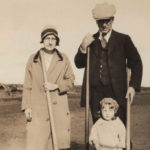We run our website the way we wished the whole internet worked: we provide high quality original content with no ads. We are funded solely by your direct support. Please consider supporting this project.
A Calvinist Take on the Problem of Evil
Here’s a Calvinist view on the problem(s) of evil in the wake of the Sandy Hook shootings. It’s the old God-as-author analogy. In essence, this is how Calvinism views God’s role in any instance of radical evil (quoted from the Desiring God article):
But, of course, the Bible says more than that God could have prevented it; it says that it occurs “according to the counsel of his will” (Eph 1:11). Indeed, he works all thingsaccording to the counsel of his will. And when the Bible says ‘all things,’ it means all things:
This ‘all things’ includes the fall of sparrows (Matt 10:29), the rolling of dice (Prov 16:33), the slaughter of his people (Ps 44:11), the decisions of kings (Prov 21:1), the failing of sight (Exod 4:11), the sickness of children (2 Sam 12:15), the loss and gain of money (1 Sam 2:7), the suffering of saints (1 Pet 4:19), the completion of travel plans (Jas 4:15), the persecution of Christians (Heb 12:4–7), the repentance of souls (2 Tim 2:25), the gift of faith (Phil 1:29), the pursuit of holiness (Phil 3:12–13), the growth of believers (Heb 6:3), the giving of life and the taking in death (1 Sam 2:6), and the crucifixion of his Son (Acts 4:27–28). (John Piper, “Why I Do Not Say ‘God Did Not Cause This Calamity, But He Can Use It For Good’”)
All things — good, bad, ugly, and horrific — are ordained, guided, and governed by the Creator and Sustainer of the universe.
The God-as-author analogy fleshes out regarding the problem of evil like this (from the Desiring God article):
The Classic Problem of Evil
Stated simply, the philosophical problem goes like this:
(1) If God is all-knowing, then he knows what evil is.
(2) If God is all-good, then he himself is not evil and he would prevent evil, if he could.
(3) If God is all-powerful, then he can prevent evil.
(4) Evil exists.
(5) Therefore (1), (2), or (3) (or some combination), must be false.The author-story analogy clearly holds to (1) and (3). It’s (2) that is denied, since God remains all-good even if he allows and ordains evil for his own wise and good purposes. In other words, God may ordain that evil exist because the existence of evil serves somegreater good that God has in view. The author-story analogy sheds light on how God is not tainted by the evil of his creatures and on why God would ordain evil for his own wise purposes.
Frankly, this creates more problems than it solves, not the least of which: how, exactly are we to genuinely love this kind of God? Roger Olson responded to this article with his own really good question here. Especially in light of our article yesterday about Henry, this kind of theologizing is beyond incomprehensible to us. Here’s Roger’s question:
If I could talk to Rigney (or someone who agrees with him), here is what I would ask:
“You seem to believe that people who understand God’s sovereignty the way you do (as all-determining, comprehensive, meticulous) rightly feel not only shock but abhorrence at events such as school shootings in which multiple children are killed. But why? My question is not why you DO, but why you think it’s right to have such feelings. I”m not asking about moral rightness; I’m asking about logical rightness.
That’s a good question.
This is why we’re here. ReKnew is committed to spreading the good news of Jesus who loves us by being born into our suffering and healing our diseases and dying on a Roman cross as opposed to the theology of an omni-controlling deity who ordains the slaying of children for his own mysterious purposes.
Category: General
Tags: Calvinism, Current Events, Death, Henry, Problem of Evil, ReKnew, Roger Olson, Theodicy
Related Reading

Speaking of Tragedies
Since we’ve been reflecting on recent tragedies and the varying responses to them, we thought we would add this voice to the mix. This article from the New Yorker points out the differences in media coverage between the Aurora shootings and the shootings at the Sikh temple in Wisconsin. From the article: Sadly, the media…

What’s Wrong With The World?
Hartwig HKD via Compfight The reports coming out of Fort Hood this morning once again highlight that our world is messed up. And it often feels like we are rearranging the deck chairs on the Titanic as we try to find answers to address the problems we face. Here are some reflections by Greg on…

Why did God create me to be a pedophile?
Question: Since the first time I experienced a sex drive it’s been directed towards little children. I’ve never acted on this, for I know it’s wrong. But it torments me. Why would God created me with pedophile cravings? Answer: I’m so sorry for your condition and greatly respect the fact that you have committed yourself…

Podcast: Does God Actively Discipline Those He Loves?
Greg on God’s role in suffering. http://traffic.libsyn.com/askgregboyd/Episode_0272.mp3

In Darkest Times, God is Present
“However much evil was there, it would have been far worse if God was not there pushing back on it.” There is never a time when God is not present, no matter how bad the situation. In this short sermon clip, Greg Boyd talks about how we need to be watchful of the spirit world…

Free Will: An Aesthetic Model
Greg continues his thoughts on free will by offering an aesthetic model for free will. This one gets pretty philosophical, but it’s worth toughing it out.

